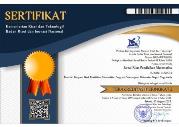Mathematical problem solving proficiency of students with musical and kinesthetic intelligence
Pathuddin Pathuddin, Magister Program of Mathmatics Education, Universitas Tadulako, Palu
Rabiyatul Adawiyah, Magister Program of Mathmatics Education, Universitas Tadulako, Palu, Indonesia
Abstract
The purpose of this study was to obtain a description of the results of the analysis of mathematical problem solving for students with musical intelligence and kinesthetic intelligence. This type of research is qualitative research. The research subjects were one student with musical intelligence and one student with kinesthetic intelligence. The results of this study indicate: Students with musical intelligence have low problem-solving abilities. It can be seen from the students' ability to solve the given mathematical problems, that is, students are less thorough in obtaining information about what is known and asked, students are not able to express a plan to explain the problem solving plan they want to do. students do not write down the complete solution, students do the calculation again only in the final step. Meanwhile, students who have kinesthetic intelligence have good problem-solving skills. It can be seen from the students' ability to solve the given mathematical problems, namely students are able to express what is known and asked in the questions using their own language. students cannot express the steps to be taken in solving the problem, students write down in full what is known and asked in full, students re-examine the results of their work by looking at and recalculating the answers that have been obtained.
Keywords
Full Text:
PDFReferences
A’isyah, S. (2018). Pengaruh Kecerdasan Lingusitik, kecerdasan Logismatematis, dan Kecerdasan Spasial Terhadap Kemampuan Pemecahan Masalah Matematika Peserta Didik SMP/Mts di Kecamatan Cerme. http://eprints.umg.ac.id/3143
Ardiana, R. (2022). Pembelajaran berbasis kecerdasan majemuk dalam pendidikan anak usia dini. Murhum : Jurnal Pendidikan Anak Usia Dini, 3(1), 1-12. https://doi.org/10.37985/murhum.v3i1.65
Damayanti, W. F., Iskandar, R. S. F., & Safitri, P. T. (2022). Pengaruh Kecerdasan Visual-Spasial Dan Kreativitas Siswa Terhadap Kemampuan Pemecahan Masalah. Seminar Nasional Pendidikan Matematika UMT, 33, 22–29. https://jurnal.umt.ac.id/index.php/cpu/article/view/6849
Dwianjani, N., Candiasa, I, M., Sariyasa. (2018) Indentifikasi Faktor-faktor yang Mempengaruhi Kemampuan Pemecahan Masalah Matematika. Numerical: Jurnal Matematika dan Pendidikan Matematika, Vol 2 No. 2. https://doi.org/10.25217/numerical.v2i2.276
Firdayanti, S. R., Artharina, F. P., & Purnamasari, V. (2019). Keefektifan Model Pembelajaran Problem Posing Terhadap Pemecahan Masalah Matematika. Thinking Skills and Creativity Journal, 2(2), 57-62. https://doi.org/10.23887/tscj.v2i2.20710
Hafni, R.N., Herman, T., Nurlaelah, E., & Mustikasari, L. (2020). The importance of science, technology, engineering, and mathematics (STEM) education to enhance students' critical thinking skill in facing the industry 4.0. Journal of Physics: Conference Series 1521 042040. https://doi.org/10.1088/1742-6596/1521/4/042040
Hasibuan, M. F. (2019). Hubungan Kecerdasan Linguistik Dengan Hasil Belajar Matematika Siswa Kelas Xi Sma Taman Siswa Lubuk Pakam. Journal Of Computer Networks, Architecture and High Performance Computing, 1(1), 41–48. https://doi.org/10.47709/cnapc.v1i1.44
Hermiyati, Y. E., Rizal, M., & Rochaminah, S. (2015). Proses Berpikir Siswa Smk Dengan Kecerdasan Musikal [Thinking Processes os Senior Vocational School Students with Musical Intelligence]. Jstt, 49–58. http://jurnal.untad.ac.id/jurnal/index.php/JSTT/article/view/6928/5567
Miles, M. B., & Huberman, A. M. (2014). Qualitative Data Analysis, A Methods Sourcebook, Edition 3. In News.Ge. https://www.ptonline.com/articles/how-to-get-better-mfi-results
Milsan, A. L., & Wewe, M. (2018). Hubungan Antara Kecerdasan Logis Matematis [Relation between Logical and Mathematical Intelligences]. Journal of Education Technology, 2(20), 65–69. https://doi.org/10.23887/jet.v2i2.16183
Nahdataeni, S. S.,& Linawati. (2015). Proses Beroikir Siswa dalam Memecahkan Masalah Sistem Persamaan Linear Duan Variabel dengan Langkah Polya Ditinjau dari Gaya Belajar Kelas X SMA Negri 2 Palu. Aksioma, 4(2), 203–215. https://doi.org/10.22487/aksioma.v4i2.114
Nuraini, Maimunah, & Roza, Y. (2019). Analisis Kemampuan Pemecahan Masalah Siswa Kelas VIII SMPN 1 Rambah Samo Pada Materi Bangun Ruang Sisi Datar. Numerical: Jurnal Matematika Dan Pendidikan Matematika, 3(1), 63–76. https://doi.org/10.25217/numerical.v3i1.477
Sari, N., & Oktariani. (2019). Mengenal dan Mengidentifikasi Kecerdasan Majemuk Pada Anak. Seminar Nasional Hasil Pengabdian Kepada Masyarakat 2019, 334–337. http://dx.doi.org/10.30700/sm.v1i1.601.
Setiawan, D., & Nisa, K. (2018). Kajian Kecerdasan Majemuk pada Beberapa Model Pembelajaran Kooperatif. Semdikjar 2, 215–222. http://conference.unpkediri.ac.id/
Sugiyono. (2013). Metode Penelitian Kuantitaif,Kualitatif dan R&D. In Alfabeta (Issue 465).
Syarifah, S. (2019). Konsep Kecerdasan Majemuk Howard Gardner. SUSTAINABLE: Jurnal Kajian Mutu Pendidikan, 2(2), 176–197. https://doi.org/10.32923/kjmp.v2i2.987
Wang, Y., Chiew, V. (2010). On the cognitive process of human problem solving. Cognitive Systems Research. 11(1) 81-92. https://doi.org/10.1016/j.cogsys.2008.08.003
DOI: https://doi.org/10.21831/jrpm.v10i2.64990
Refbacks
- There are currently no refbacks.
Copyright (c) 2023 Jurnal Riset Pendidikan Matematika

This work is licensed under a Creative Commons Attribution-ShareAlike 4.0 International License.
Jurnal Riset Pendidikan Matematika indexed by:

Jurnal Riset Pendidikan Matematika by http://journal.uny.ac.id/index.php/jrpm/index is licensed under a Creative Commons Attribution-ShareAlike 4.0 International License.
All rights reserved. p-ISSN 2356-2684 | e-ISSN 2477-1503
View My Stats















